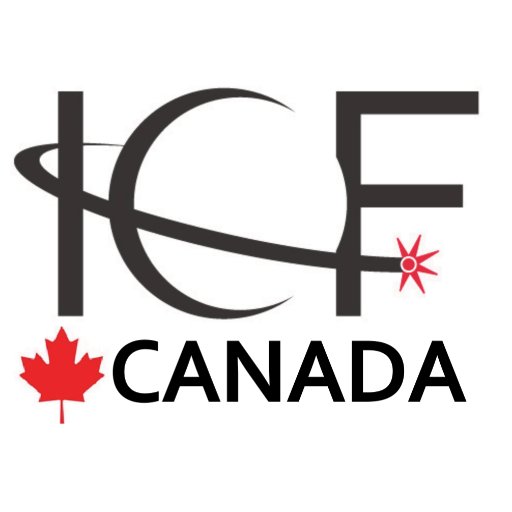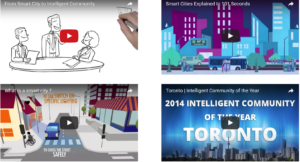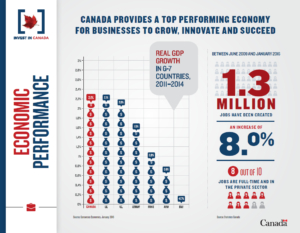
ICF Canada Newsletter #33 June 27, 2017

Melbourne scores globally as Intelligent Community of the Year
Article by Jay Gillette, professor of information and communication sciences at Ball State University originally published in ITWorld Canada @itworldca June 14, 2017.
Melbourne, Australia, won “Intelligent Community of the Year” at the New York-based Intelligent Community Forum’s annual ICF Summit. The ICF also for the first time called for affordable broadband to be declared a utility for public benefit by cities and official agencies. The prestigious annual award measures communities on six “Intelligent Community Indicators”: Broadband, Knowledge Workforce, Innovation, Digital Equality, Sustainability, Advocacy. Melbourne impressed the ICF and its international jury by the city’s commitment to fill broadband gaps left by of monopoly or duopoly providers, for its population of 130,000 in the larger metro area of 4.5 million people. Nearly 47% of Melbourne’s people have a university degree. Frustrated users outside the core area pushed to develop a 100 Mbps service called “Lightning Broadband” using optical fiber and wireless to provision underserved areas. Melbourne also scored well by committing education and technology training for lower participating groups, elders and youth in particular. Its “Code Like a Girl” initiative aims to increase skills for females from 13 through age 45, for example. The city, which is the capital of Australia’s Victoria state, has worked with its research communities to create innovation districts and startup sites. Yet Melbourne has also used technology to help its homeless. Surprisingly, research showed 80% of the homeless had a mobile phone, so the city responded by building an app called “Ask Izzy” to direct them to shelter and practical survival resources.
| Read the official ICF Press Release |
This year’s ICF Summit produced another surprise, an unusual resolution from the Board of the nonprofit, nonpartisan ICF think tank. It called for cities and agencies to declare “high-speed, high-capacity, affordable broadband a utility: an essential infrastructure service provided principally for public benefit.” The Intelligent Community Forum stated:
The resolution does not recommend or require public ownership of broadband assets. Instead, it is it is meant to encourage an increasing diversity of operating models including private ownership, public-private partnerships, open-access networks and community-owned networks to achieve the goal of ubiquitous coverage. It recognizes that “utility” – also called an “essential service” or “service of general interest” – is a term with legal ramifications.
In an era where regulators are still influenced by the deregulatory rhetoric of the late 20th century, ICT’s resolution addresses the changing role of the internet and the broadband economy in the 21st century. As with the example of Melbourne’s homeless population with their mobile phones, communities worldwide are working against a new background of information and communication services as an essential foundation for the activities of their citizens’ daily lives.

Vietnam’s “New City” seeks Intelligent Community status from start
The summit’s annual “Revolutionary Community” keynote presentation featured Dr. Viet-Long Nguyen, an official of a state-owned development agency in Vietnam. He spoke about its Binh Duong initiative, Vietnam’s first Intelligent Community. Relying on the ICF’s six core indicators and assistance from Eindhoven, Netherlands, the 2011 winner, the country is developing “New City,” for one million citizens, from the ground up. Vietnam now has 93 million people, with a per-capita deployment rate of mobile phones at 145%. The New City planners see opportunities in the shift of manufacturing from China to surrounding Asian nations, and the potential ASEAN market of 600 million customers.

Artificial Intelligence as a disruptive driver for smarter cities
ICF co-founder Robert Bell led an Urban Master Class with a major focus on the coming impact of artificial intelligence. This is a component of what Bell calls “Community Intelligence,” where a significant share of a city’s citizens, employers, and nonprofits have a common understanding of issues, and collaborate to achieve a shared vision of the future. Bell says we need a clearer view of the potential impact of artificial intelligence on jobs, quoting research that shows:
- 29% of jobs are likely to see decline in demand across the board
- 32% will see big disruptions that hit individuals but do not wipe out whole categories of employment
- 39% of jobs will remain stable or grow.
He notes the paradox of technology innovation on bank tellers as an occupation. With the coming of the ATM (Automated Teller Machine) in the 1990s, it was seen as the trigger for a decline in bank teller employment. Yet since the year 2000, full-time human bank teller jobs have grown 2 percent a year on average, faster than other parts of the labor force. The reason: ATMs let banks operate branches more cheaply, which led to opening more branch banks. Human tellers now can focus on more than routine cash handling, on customer service and marketing for example. The human touch becomes a value-adding service. Bell cited research that indicates artificial intelligence could have economic impact through increased productivity, ranging from $814 billion in UK, $1 trillion in Germany, $2 trillion in Japan, to $8.3 trillion in USA, despite job churn. He concludes: “So there’s a tremendous amount of potential value to unlock in this next information technology revolution. The question is how can your community position itself to gain from this change instead of being run over by it?”
Bell says Intelligent Community Forum exists to help prepare cities and citizens to find the answers, to help people see that such issues are everybody’s problem and everybody’s responsibility. He says that gives him hope in this disruptive future. Besides the winning city of Melbourne, the complete list of 2017 intelligent community finalists is:
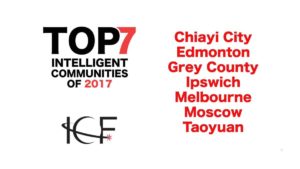
The 2018 Intelligent Community of the Year competition opens with nominations in July, with the closing deadline in fall 2017. Seven new finalists will be announced early in 2018. The winner will be named at the annual Summit in June 2018, to be held in London, United Kingdom.
| Jay Gillette is professor of information and communication sciences at Ball State University, director of its Human Factors Institute, and a senior research fellow at the Digital Policy Institute. He also served as Fulbright-Nokia Distinguished Chair in Information and Communications Technologies at the University of Oulu, Finland for 2014-2015. |
ANNOUNCEMENT: Submission opens June 29, 2017 for the 2018 Intelligent Community Awards Program: see the ICF and ICF Canada Websites for details on how you can be recognized as a 2018 SMART21 Community in October, 2017, leading to TOP7 and Intelligent Community of the Year in 2018.
Snaps from ICF’s 2017 Summit in NYC
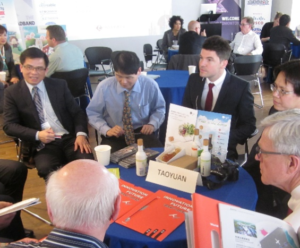
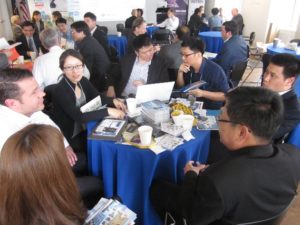
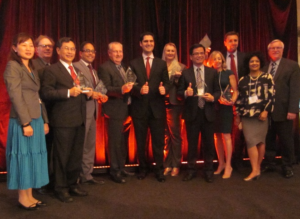
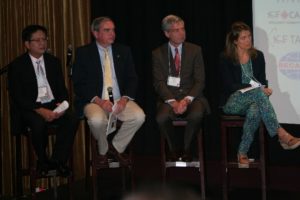
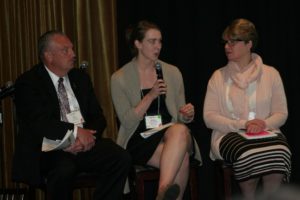
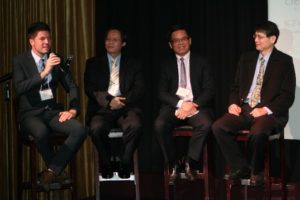
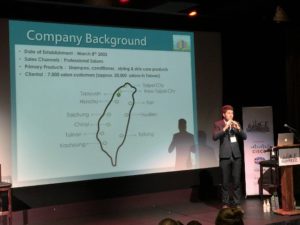
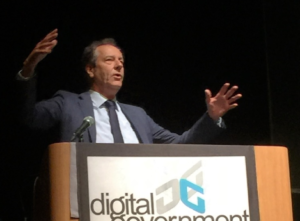

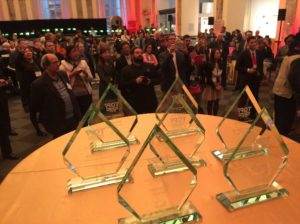
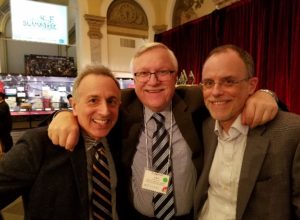
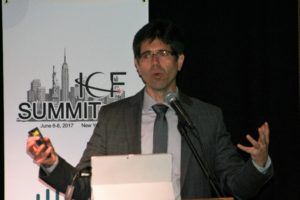
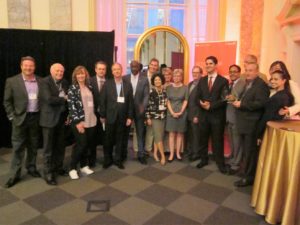
ICF Canada’s New Website designed as an Economic Development Tool
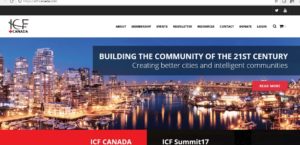

When ICF Canada set out to redevelop its initial Website, it specifically designed the new website to be an active tool for international investors and for ICF Canada’s SMART21 and Intelligent Communities to communicate their respective interests to each other. ICF Canada’s member communities are able to add to their webpage with vital investor statistics, videos and critical links to their website and publications. Investors can connect with these communities, institutions and local firms to develop research partners and develop business and investment opportunities. Check it out at: http://icf-canada.com/canadas-intelligent-communities/
In addition, check out the videos on ICF Canada’s website. To view some of the smart city videos we have posted, see: https://icf-canada.com/video/ . Check out our own new animation: “From Smart City to Intelligent Community” https://www.youtube.com/watch?v=dR1QZttXzGw . We also have the 2017 TOP 7 Communities video available at https://www.youtube.com/watch?v=vXW7pQev1gI
Canada’s Smart City Challenge… what will it be?

Many communities are watching anxiously for details of Prime Minister Justin Trudeau’s support for municipalities, also known as the Smart City Challenge. As we all remember, a $300M commitment was made in the 2017 budget to support Canadian municipalities to take a leading position in coming up with innovative proposals which could lead to ground-breaking “smart city projects”. It is the goal of the Canadian federal government to make the right investments in our Canadian communities that could lead in making a lasting impact in terms of their liveability, economy, culture and overall competitiveness.
We don’t know much yet about the Smart City Challenge, but that should not stop communities and people across the country from beginning a conversation about how they can make an impact by taking risks through innovation, collaboration and the application of technology and smart practices to achieve real, measurable results that will matter for every citizen in their communities. We are asked to identify top priorities for improving our communities and a plan and commitment to see them through. Those that come up with the most ingenious ideas will win the following prizes:
|
Prizes Each round will include: one (1) large prize of $50 million; two (2) prizes of $10 million for mid-sized communities; one (1) prize of $5 million for a small community; and one (1) prize of $5 million available for an Indigenous community.
Specifics around the eligibility size thresholds will be made available at a later date. |
The Smart Cities Challenge is a merit-based, pan-Canadian initiative, inviting cities of all sizes, as well as Indigenous communities, to participate in 3 rounds, the first of which is set to launch in the Fall of 2017. More information will follow over the next several months. Visit Infrastructure Canada’s website for announcements and updates: http://www.infrastructure.gc.ca/plan/cities-villes-eng.html
Twitter @INFC_eng #smartcitiesCanada.
Thanks to all the Canadian communities, universities and private sector who helped to sponsor the TOP7 Reception at ICF Summit17 under the ICF Canada banner. Great collaboration to make it happen.
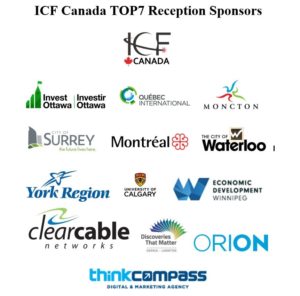
Upcoming Events
http://globalforum.items-int.com
The 26th edition of the Global Forum/Shaping the Future (October 2nd & 3rd) is co-organized with the City of Winnipeg and the University of Winnipeg, with the support of the Premier of Manitoba. It is an annual, international, high profile, thought-provoking and self-sustained event dedicated to business, policy and strategy issues affecting the Digital Society gathering each year, more than 300 key policy-makers and public/private stakeholders from more than 30 countries, from all continents.
For more information, please consult the GF website: http://globalforum.items-int.com/
October 17, 2017 | Ottawa
Your Forum for Connecting Government & Technology to
Drive Public Sector Transformation in Canada!
Ottawa, Ontario
https://www.canadianinstitute.com/govconnect-canada-2017/apply-now/
March 20-22, 2018 Toronto, Ontario
THINK CANADA 2018 GLOBAL BUSINESS SUMMIT
An Elite One-Stop Opportunity to Expand Your Business to Canada
LET US FIND YOUR MATCH
Distributors
Clientele/Customers
Site Selection
Suppliers
Government Incentives & Grants
Joint Venture Partners
LET US GUIDE YOUR EXPANSION
Legal Advisory Services
Immigration Law
Accounting & Finances
Sales/Marketing
Real Estate
Talent Acquisition / HR Services
Early Bird Price Until Aug 1st, 2017
More information to come:
https://www.thinkcanada.org/welcome/think-canada-business-summit-2017
Mark your Calendars:
LONDON 2018 SUMMIT
June 2018 – watch for new ICF theme and details about the London ICF Summit

Invest in Canada’s FDI Infographics:
Source: http://www.international.gc.ca/investors-investisseurs/assets/pdfs/download/Infographics.pdf .
NEWS:
Eastern Canada
Quebec
Ontario
- Kik unveils crypocurrency:
- Blockchain goes mainstream as Kik unveils cryptocurrency ‘Kin’
- Canadian VC funding climbs to 10-year high as technology booms
- Six ideas we should steal from Melbourne
- How a five-minute talk put D2L on the road to success
- eleven-x expands IoT network to cities across Canada
- Communitech – 20 years in the making
- Canadian BRAIN GAIN
Western Canada
Global Media
- Melbourne wins Intelligent Community of the Year
- Melbourne Lighting the way.
- Melbourne selected as Top City
- Melbourne Press Release
- Melbourne Most Liveable and Intelligent City in the World 2017
- Melbourne News
- Validation for Vic Tech Policy
- Hong Kong evaluates introduction of a Congestion Charge
- Sorry humans, Microsoft’s AI is the first to reach a perfect Ms. Pac-Man score
- 5G Hub in Oulu
![]()
![]()
Want to have a voice in iCommunity.ca, the official newsletter of ICF Canada? Please send your blogs, announcements and other interesting content to John G. Jung at [email protected]
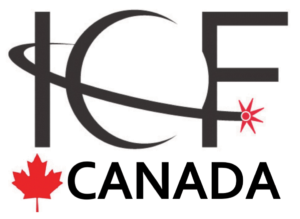
ICF Canada 1310-20 Bay Street Toronto, Ontario M5J 2N8 www.icf-canada.com
Contact: John G. Jung at [email protected] 1-647-801-4238 cell
Want to change how you receive these emails?
You can update your preferences or unsubscribe from this list
